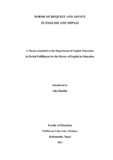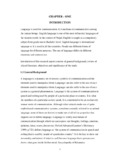Please use this identifier to cite or link to this item:
https://elibrary.tucl.edu.np/handle/123456789/1815Full metadata record
| DC Field | Value | Language |
|---|---|---|
| dc.contributor.author | Khadka, Gita | |
| dc.date.accessioned | 2021-05-02T06:32:03Z | |
| dc.date.accessioned | 2021-07-23T02:47:48Z | - |
| dc.date.available | 2021-05-02T06:32:03Z | |
| dc.date.available | 2021-07-23T02:47:48Z | - |
| dc.date.issued | 2014 | |
| dc.identifier.uri | http://elibrary.tucl.edu.np/handle/123456789/1815 | - |
| dc.description.abstract | This research entitled “Forms of Request and Advice in English and Nepali”was carried out to find out the terms of request and advice used in English andNepali language and to compare the forms of request and advice used in theselanguages. It compared the forms on the basis of the relationship with friends,shopkeepers, strangers, neighbors, parents, boss, relatives, sisters and brothers,and sons. The data were collected from the 40 native speakers oftheNepalilanguage. The informants were selected usingjudgmentalsampling procedurefrom Kirtipur Municipality in Kathmandu district. The data were collected withthe help of questionnaire and interview schedule. Thedata for English werecollected from different books, thesis, dictionaries and articles. The researcherfound that in comparison to English speakers Nepalinative speakers were lesspolite while requesting their intimate friends. Nepalinative speakers used morepolite forms to the strangers than to friends. They did not use impoliteforms totheir parents while requesting. Nepalinative speakers used polite forms ofadvice to the seniors, strangers andnew friends. The study is divided into four chapters. Chapter one is an introductory chapter.It includes general background, reviewof the related literature, objectives ofthe study, and significance of the study. Chapter two deals with themethodology applied to carry out the research under which sources of data,sampling procedure, tools for data collection, process of data collection andlimitations of the study have been presented. Chapter three presents analysisand interpretation of the data. In this section both statistical as well asdescriptive approach has been used. Chapter four incorporates findings andrecommendations of the research. The reference and appendices form theconcluding part of the thesis. | en_US |
| dc.language.iso | en_US | en_US |
| dc.publisher | Faculty of Education | en_US |
| dc.subject | Nepali language | en_US |
| dc.subject | pedagogical implications | en_US |
| dc.title | Forms of Request And advice in English and Nepali | en_US |
| dc.type | Thesis | en_US |
| Appears in Collections: | English Language Education | |
Files in This Item:
| File | Description | Size | Format | |
|---|---|---|---|---|
| COVER.pdf | 32.42 kB | Adobe PDF |  View/Open | |
| CHAPTER.pdf | 231.69 kB | Adobe PDF |  View/Open |
Items in DSpace are protected by copyright, with all rights reserved, unless otherwise indicated.
